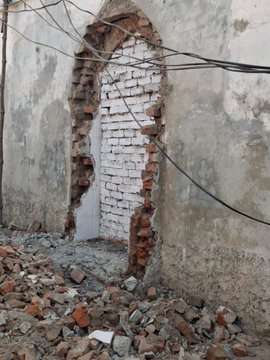In the dead of night on April 9, 2025, a tragic and unlawful event unfolded in the Nankana District of Pakistan. At around 11 pm, the police of the Sadar Sangla Hill Police Station carried out the illegal demolition of the minarets and mihrabs at two places of worship belonging to the Ahmadiyya community in Kot Rehmat Khan and Hamrajpura. This shocking act of injustice was done under the cover of darkness, leaving the community devastated and helpless.
The events leading up to this brutal violation of human rights began much earlier. For weeks, Tehreek-e-Labbaik, an extremist religious group, had placed increasing pressure on the local administration, demanding the destruction of the Ahmadiyya places of worship. On March 30, a tense meeting took place between the local Ahmadiyya leaders and government officials, including AC Sangla Hill Zaheer Ahmed and DSP Ijaz Ahmed Dogar. In this meeting, the government agents pushed the leaders of the Ahmadiyya community to tear down the minarets and mihrabs themselves—an offer the community refused with great dignity. They made it clear that they would never desecrate their places of worship and that if the government intended to demolish them, they should provide a written order.
But the hope for justice was dashed when, in the stillness of the night, the authorities bypassed the rule of law. Armed with no written order, the police descended upon these sacred sites. Despite the pleas of local Ahmadiyya officials demanding a legal order, the police forcefully tore down the minarets and mihrabs—symbols of faith, identity, and resilience for the Ahmadiyya community.
This dark act of destruction is not merely a violation of property but a profound assault on the dignity and freedom of an entire community. The minarets and mihrabs are not just architectural features; they are sacred representations of the Ahmadiyya people’s deep spiritual connection to their faith. For them, the destruction of these structures is a wound that cuts deeper than any material loss—it is an assault on their right to practice their religion freely, to exist without fear of oppression.
This incident is part of a broader pattern of persecution faced by the Ahmadiyya community in Pakistan. In November 2024, police and extremists destroyed minarets at three Ahmadi worship sites in Punjab, sparking legal and human rights debates. Earlier, in June 2024, an 18-year-old murdered two Ahmadis, aged 60 and 30, in Mandi Bahauddin, Punjab, in a targeted killing.
The Human Rights Commission of Pakistan reported at least 34 attacks on Ahmadi religious sites in 2023, highlighting the systemic nature of this persecution.
As these sacred symbols lie in ruin, one must ask: where is the respect for human rights, the rule of law, and the promises of justice? The events of that night echo the wider, tragic reality faced by the Ahmadiyya community in Pakistan, who have been subjected to years of persecution and discrimination. The demolition is not an isolated incident but a chilling reminder of the continued marginalization and suffering they endure.
International human rights organizations and local activists alike must raise their voices in condemnation of this unlawful act and demand accountability. The world must stand with the Ahmadiyya community, not only to prevent further destruction but to ensure that those who commit such acts of violence and bigotry face justice.
The destruction of the minarets and mihrabs in Sangla Hill is not just an attack on a physical structure—it is an attack on the very essence of religious freedom. As we stand witness to this sorrowful chapter, we must remember that the fight for justice is not just about protecting buildings, but about ensuring that every individual, regardless of their faith, can live free from fear and oppression. It is time to demand action, to seek justice, and to ensure that such dark deeds are never repeated.
Let us raise our voices for the Ahmadiyya community, so that their dignity, their faith, and their right to worship in peace may be restored.
